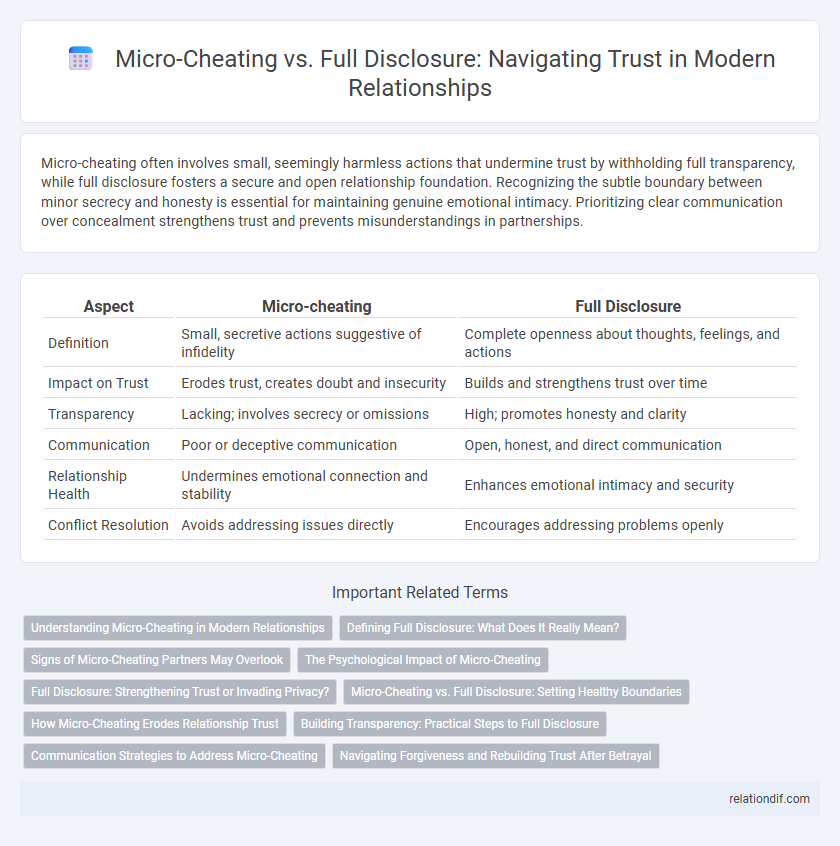Micro-cheating often involves small, seemingly harmless actions that undermine trust by withholding full transparency, while full disclosure fosters a secure and open relationship foundation. Recognizing the subtle boundary between minor secrecy and honesty is essential for maintaining genuine emotional intimacy. Prioritizing clear communication over concealment strengthens trust and prevents misunderstandings in partnerships.
Table of Comparison
| Aspect | Micro-cheating | Full Disclosure |
|---|---|---|
| Definition | Small, secretive actions suggestive of infidelity | Complete openness about thoughts, feelings, and actions |
| Impact on Trust | Erodes trust, creates doubt and insecurity | Builds and strengthens trust over time |
| Transparency | Lacking; involves secrecy or omissions | High; promotes honesty and clarity |
| Communication | Poor or deceptive communication | Open, honest, and direct communication |
| Relationship Health | Undermines emotional connection and stability | Enhances emotional intimacy and security |
| Conflict Resolution | Avoids addressing issues directly | Encourages addressing problems openly |
Understanding Micro-Cheating in Modern Relationships
Micro-cheating involves subtle behaviors like secret messaging or emotional flirting that undermine trust without crossing clear boundaries of full infidelity. Recognizing these actions helps partners address underlying issues before they escalate into full disclosure-required betrayals. Awareness of micro-cheating patterns promotes healthier communication and reinforces emotional security in modern relationships.
Defining Full Disclosure: What Does It Really Mean?
Full disclosure in relationships entails openly sharing all relevant information, including thoughts, feelings, and behaviors, to foster complete transparency and trust. Unlike micro-cheating, which involves subtle, often hidden actions that can erode trust, full disclosure demands accountability and honesty about one's interactions and intentions. Embracing full disclosure strengthens emotional intimacy and helps prevent misunderstandings that often arise from secrecy or partial truths.
Signs of Micro-Cheating Partners May Overlook
Signs of micro-cheating often include secretive texting, excessive flirting, and emotional intimacy with others that partners may overlook as harmless. These subtle behaviors can erode trust gradually, creating uncertainty and insecurity in the relationship. Recognizing early micro-cheating enables timely conversations to maintain transparency and prevent breaches of full disclosure.
The Psychological Impact of Micro-Cheating
Micro-cheating, involving subtle behaviors like secret texting or emotional intimacy outside a relationship, often erodes trust by creating uncertainty and suspicion. This form of partial deceit triggers anxiety and insecurity, damaging emotional well-being and undermining relationship stability. Full disclosure fosters transparency, reducing psychological distress by promoting open communication and reinforcing mutual trust.
Full Disclosure: Strengthening Trust or Invading Privacy?
Full disclosure in relationships fosters transparency that can significantly strengthen trust by eliminating secrets and creating a solid foundation for emotional intimacy. However, excessive transparency risks invading personal privacy, potentially undermining individual autonomy and triggering feelings of resentment or suffocation. Balancing openness with respect for boundaries is crucial to maintaining a healthy dynamic where trust thrives without compromising personal space.
Micro-Cheating vs. Full Disclosure: Setting Healthy Boundaries
Micro-cheating involves subtle actions that may breach trust without outright infidelity, often causing confusion and emotional distress in relationships. Full disclosure fosters transparency and open communication, enabling partners to establish clear, healthy boundaries that protect mutual trust. Setting boundaries based on honest dialogue minimizes misunderstandings and strengthens relational security.
How Micro-Cheating Erodes Relationship Trust
Micro-cheating, characterized by subtle acts of emotional or physical infidelity such as secret texting or flirting, gradually undermines relationship trust by creating doubts and insecurities. Unlike full disclosure, which fosters transparency and mutual understanding, micro-cheating introduces secrecy that damages emotional intimacy. Over time, repeated micro-cheating behaviors erode the foundation of trust, leading to increased conflict and weakened connection between partners.
Building Transparency: Practical Steps to Full Disclosure
Building transparency in relationships requires clear communication and consistent honesty, which are essential to move from micro-cheating to full disclosure. Establishing regular check-ins and setting shared boundaries fosters an environment where partners feel safe to express concerns without fear of judgment. Practicing full transparency not only rebuilds trust but also strengthens emotional intimacy by minimizing misunderstandings and hidden behaviors.
Communication Strategies to Address Micro-Cheating
Effective communication strategies to address micro-cheating involve establishing clear boundaries and promoting honest dialogue about behaviors that may be perceived as betrayals. Encouraging partners to express feelings openly and discuss expectations reduces misunderstandings and fosters trust rebuilding. Implementing regular check-ins and active listening techniques helps partners navigate discomfort and reinforces commitment to transparency.
Navigating Forgiveness and Rebuilding Trust After Betrayal
Micro-cheating involves subtle behaviors that betray trust without full disclosure, complicating the path to forgiveness and trust restoration. Full disclosure demands honest communication of all relevant details, which is crucial for rebuilding trust after betrayal and enables partners to address underlying issues directly. Navigating forgiveness requires emotional transparency, consistent accountability, and patience as both parties work to reestablish a foundation of trust and security.
Micro-cheating vs Full disclosure Infographic

 relationdif.com
relationdif.com